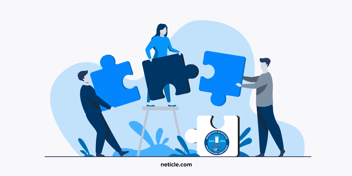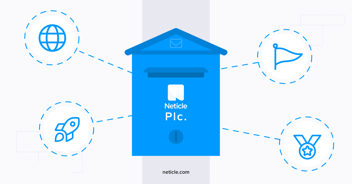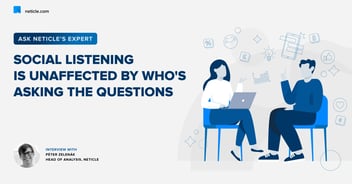NLP’s biggest benefits are speed and consistency – says Neticle’s linguist
Kinga Fegyó is Neticle’s computational linguist: she makes sure Neticle’s language models are always in top condition, and she creates the basis of new ones as well. In our interview, she gave us a behind the scenes look at how text analysis happens. Some may say it’s magic, but Kinga revealed its secrets. She also told us about the power of NLP, current industry trends & future projects she’s excited about.
What is NLP and why is it important for text analytics? How is it applied in different analytical projects?
NLP stands for natural language processing, which means processing natural languages (i.e. human languages) using different computational methods. It can be applied whenever we encounter digital text in any form.
When we hear speech or read text, our brain “decodes” it and extracts information, functioning like a black box. To imitate this via a computer, the brain’s methods need to be modeled by computational linguistics, using complex sets of rules. All the information that humans can extract should also be extracted this way. Once we have a model, decoding and text generation both become possible: this is what chatbots do, to use a well-known example. However, many people don’t realize that their everyday spell-checkers and online translators also use NLP. It is simply the basis of digital text processing: text is disassembled, analyzed, and reassembled for us all the time.
In Neticle’s case, NLP is mainly used to extract information. This can be entity recognition like topics, people, brands and places, along with the context they’re in. What are they mentioned together with the most? Are they mentioned in a positive or negative way? The next step is analysis: how can all this extracted information be used? What trends do we see, how can the data be combined? NLP has two major benefits in terms of analysis: speed and consistency. Information is extracted within minutes, and the system doesn’t make mistakes: it applies the same exact rules to all parts of the text. This is a huge advantage compared to human analysis, which is prone to subjective judgements.
Tell us some examples that best display the power of NLP in your opinion. What have been the most exciting projects that you’ve worked on at Neticle?
The purpose of automated text analysis is always to discover insights in text: this can be anything from user feedback on products to political opinions. It’s an extremely versatile thing, and it always decreases reaction time, because we don’t need to wait for a human to go through all the text. However, instead of reacting to what’s been written, we can also take a preventive approach, like in the case of our brand safety project with Gemius. Our goal here was to help brands avoid displaying their ads in controversial or sensitive contexts. I loved working on this, as it was exciting to think about how certain information can be hidden in different expressions and terms.
Another example is the Lingusta project, where we worked on optimizing email subjects for marketing purposes. Besides these, I always enjoy when new languages are added to Neticle’s repertoire.
Social listening and CX research aren’t the only things NLP can be used for. Do you see a trend in 2023 that shows this kind of use is becoming more common?
Yes, there are two main trends. The first thing is that there is growing trust. NLP is on the rise now: more companies are realizing how useful it is. Organizations used to be extremely protective of their data, and didn’t dare to hand it over for analysis, but now, provided that data management laws are being respected, they understand that it’s worth working with a third party to extract insights from their textual data. They get much more and in much less time than without it.
Data-driven decisions are becoming the norm. Companies do not need to rely on hunches anymore: they can find out what clients actually need.
The second thing that’s changing is that people used to doubt the accuracy of automated text analytics. They couldn’t imagine that it could be as good as if a human was reading all the text, but the technology has proven itself and they’re starting to truly rely on us. This is partially due to the popularity of chatbots, though NLP’s reputation has always been fluctuating. Since people don’t really understand it, they sometimes used to regard it as a kind of miracle and expected it to do impossible things: disappointment was then inevitable. We’re on an upward trend now, large companies even invest in their own NLP solutions, for example some banks have chatbots that were developed in-house.
I must add that in an economic crisis like the one we’re in, being data-driven has extra benefits and importance. Companies simply cannot afford to rely on guesses. However, it is important to keep in mind that NLP does not have omnipotent power, even though it is developing all the time and produces great results. Humans should also be there to work with the results it gives them: they need to make the data driven decisions.
What project or capability would you like to see become reality in the life of Neticle, in which NLP is involved?
It is always exciting when new languages are being added, especially when it is not an Indo-European language, or if it uses a non-Latin script, like Arabic, Japanese, or Chinese. I would love to challenge myself and work on these. Another capability that I would like to see in our repertoire is the transcription of voice to text. Neticle already works with transcribed text data, but doesn’t provide the transcription itself yet. We always strive to do more for our clients, so this would be a great addition!
If you’re intrigued, learn more about what Neticle can do in terms of text analysis, or book a demo!
Share:


